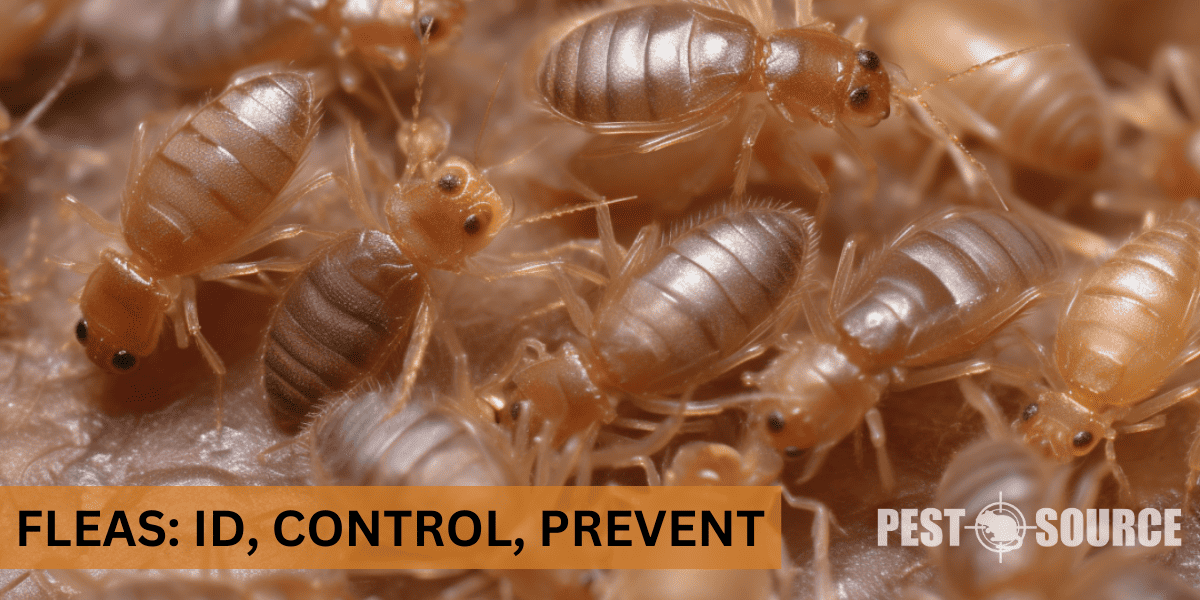In this comprehensive guide on how to get rid of fleas, we delve into the world of these tiny, wingless pests that are a nuisance to both humans and their pets. The article starts by providing essential information on what fleas are, why flea control is necessary, and what causes a flea infestation.
It then addresses the challenges of flea eradication and the reasons why these pests may keep recurring in your environment. You’ll learn how to identify a flea problem, understand the impacts of flea infestations on both pets and humans, and discover practical measures on how to get rid of fleas in your house using household items and home remedies.
The article also discusses the effectiveness of home remedies, the best professional treatments available, and how professional flea extermination services work.
Additionally, we’ll explore how to prevent a flea infestation in your house and keep your pets flea-free, while highlighting the signs of flea infestation on pets and introducing some of the best preventive products against fleas.
Finally, the guide concludes with advice on how to get rid of fleas on your dog, why some fleas are so hard to kill, and whether fleas can go away on their own.
What are Fleas?
Fleas, scientifically known as Siphonaptera, represent a category of diminutive, apterous insects that subsist on hematophagy (the consumption of blood) from both animals and humans. These creatures are distinguished by their astonishing saltatory capabilities, possessing the ability to leap considerable distances relative to their size. Another noteworthy characteristic of fleas is their prolific reproductive cycle, which allows their populations to proliferate swiftly. Implementing effective flea control measures is fundamental to fostering a salubrious and comfortable living environment for us and our companion animals.
Characteristics of Fleas
Understanding the unique characteristics of fleas is essential in tackling their infestation effectively. Below is a table that highlights their size, lifespan, jumping ability, reproduction rate, host preferences, and survival tactics, providing a concise overview of what makes fleas such formidable pests.
| Characteristic | Description | Impact |
|---|---|---|
| Size | Tiny, wingless insects | Hard to detect with the naked eye |
| Lifespan | Adult fleas can live up to 100 days | Allows for extended periods of infestation |
| Jumping Ability | Can leap 50 times their body length | Facilitates spreading and escaping predators |
| Reproduction | Can lay 50 eggs per day | Rapid increase in population |
| Host Preference | Prefer warm-blooded hosts | Affects both pets and humans |
| Survival | Can live without a host for months | Infestations can persist even without pets |
Why is Flea Control Necessary?
Flea control is necessary for several reasons:
- Fleas can cause discomfort and itching for both pets and humans, leading to skin irritations and infections.
- Fleas can transmit diseases, such as plague and typhus, to humans.
- Flea infestations can lead to anemia in pets due to blood loss.
What Causes a Flea Infestation?

Flea infestations typically occur when pets bring fleas into the home from outdoors or when fleas are introduced through other animals, such as rodents. Fleas thrive in warm, humid environments and can lay eggs in carpets, pet bedding, and other soft surfaces. Read more on what causes fleas.
Are Fleas Hard to Get Rid Of?
Fleas can be challenging to eliminate due to their small size, fast reproduction, and ability to survive without a host for extended periods. It often requires consistent and thorough treatment of both the environment and the affected animals to fully eradicate a flea infestation.
Why Do Fleas Keep Coming Back?
Fleas may keep coming back because their life cycle is not entirely interrupted. Flea eggs and larvae can be difficult to remove from the environment and may hatch after initial treatments. Additionally, fleas may be reintroduced to the home through pets or other animals.
How Can You Tell If You Have a Flea Problem?
Some signs of a flea infestation include:
- Pets excessively scratching, biting, or licking themselves
- Visible fleas or flea dirt (black specks) in your pet’s fur
- Small, red, itchy bites on your skin
- Flea eggs or larvae in carpets, bedding, or furniture
If you suspect a flea infestation, it’s essential to take action quickly to prevent the problem from worsening.
What are the Impacts of Fleas on Pets and Humans?
Fleas can have several negative impacts on pets and humans:
- Pets may develop skin irritations, infections, or anemia due to flea infestations.
- Flea bites can cause allergic reactions and discomfort for humans.
- Fleas can transmit diseases to both pets and humans, posing a significant health risk.
By identifying and addressing a flea infestation early, you can protect your family and pets from the harmful effects of these pests. Remember, the key to effective flea control is a combination of thorough cleaning, targeted treatments, and preventative measures to keep fleas from returning.
How to Get Rid of Fleas in the House?
Fleas can be a nuisance for both you and your pets. Fortunately, there are several household items that can help get rid of fleas in your house:
- Dish soap: A simple mixture of dish soap and water can be used to create a flea trap. Place a bowl of soapy water in infested areas and let the fleas jump in and drown.
- Baking soda: Sprinkle baking soda on your carpets and furniture, then vacuum thoroughly to remove fleas and their eggs.
- Salt: Similar to baking soda, salt can be used to dehydrate and kill fleas. Sprinkle it on infested areas and vacuum after a few hours.
What are Some Home Remedies to Kill Fleas?
In addition to the methods mentioned above, here are some home remedies to help get rid of fleas:
- Diatomaceous earth: This natural powder can be sprinkled on carpets, furniture, and pet bedding to kill fleas by damaging their exoskeleton.
- Apple cider vinegar: Mix equal parts water and apple cider vinegar in a spray bottle and apply it to your pet’s fur, avoiding their eyes and ears, to repel fleas.
- Lemon spray: Boil sliced lemons in water, let the mixture cool, and spray it on infested areas and your pet’s fur to repel fleas.
How Effective are Home Remedies Against Fleas?
While home remedies can provide some relief from fleas, they may not be as effective as professional treatments. Their effectiveness often depends on the severity of the infestation and how diligently you apply the remedy. In many cases, a combination of home remedies and professional treatments may be necessary to eliminate fleas completely.
What are the Best Professional Treatments for Fleas?
There are several professional treatments available to combat fleas, including:
Insect growth regulators (IGRs): These chemicals disrupt the flea life cycle by preventing eggs from hatching and larvae from developing into adults.
Adulticides: These treatments kill adult fleas, often applied as sprays or foggers.
Professional-grade flea bombs: These are more powerful than store-bought flea bombs and can be used to treat severe infestations.
How Do Flea Extermination Services Work?
Flea extermination services typically involve a multi-step process:
- Inspection: The exterminator will assess the severity of the infestation and identify the areas that need treatment.
- Treatment: The exterminator will apply the appropriate treatments, which may include IGRs, adulticides, or flea bombs.
- Follow-up: The exterminator may schedule follow-up visits to ensure the infestation is completely eradicated.
Are Professional Flea Treatments Safe for Pets and Humans?
Professional flea treatments are generally safe for both pets and humans when applied correctly. However, it’s essential to follow the exterminator’s instructions regarding safety precautions, such as vacating the premises during treatment and keeping pets away from treated areas until the chemicals have dried.
How Can You Prevent a Flea Infestation in Your House?
Preventing a flea infestation involves several steps:
- Regular cleaning: Vacuum your home frequently, especially in areas where your pets spend time.
- Wash pet bedding: Clean your pet’s bedding regularly to remove any potential flea eggs or larvae.
- Treat your yard: Use flea-repelling treatments in your yard to prevent fleas from entering your home.
How Can You Keep Your Pets Flea-Free?
To keep your pets flea-free, consider the following tips:
- Use flea preventatives: Apply flea treatments, such as collars, spot-on treatments, or oral medications, as recommended by your veterinarian.
- Groom your pets: Regularly brush your pet’s fur and check for fleas or flea dirt.
- Keep outdoor areas clean: Remove debris and maintain your lawn to reduce flea habitats.
What are the Signs of Flea Infestation on Pets?
Flea infestations can be uncomfortable and harmful for your pets. Watch out for these signs to identify an infestation:
- Excessive scratching, biting, or licking
- Red, irritated skin
- Hair loss or bald patches
- Tiny black specks (flea dirt) in your pet’s fur or bedding
- Visible fleas crawling on your pet’s body
What Are the Best Preventive Products Against Fleas?
Some of the best preventive products to protect your pets from fleas include:
- Flea collars: These can provide long-lasting protection against fleas.
- Spot-on treatments: These treatments are applied directly to your pet’s skin and can offer several weeks of flea protection.
- Oral medications: Some oral medications can kill fleas within hours and provide protection for up to a month.
By combining home remedies, professional treatments, and preventive measures, you can effectively control and prevent fleas from infesting your home and causing discomfort to you and your pets.
How Can You Get Rid of Fleas on Your Dog?
Getting rid of fleas on your dog is essential for their health and comfort. To do this, you can start by using a flea comb to remove any visible fleas and flea dirt. Next, give your dog a bath using a gentle pet shampoo that contains natural flea repellents like eucalyptus or neem oil. Once your dog is clean and dry, apply a topical flea treatment or use an oral flea medication as prescribed by your veterinarian. Remember to treat your home and your dog’s bedding to prevent future infestations.
Why Are Some Fleas So Hard to Kill?
Fleas are resilient pests that can survive in various conditions. Some reasons why fleas are hard to kill include:
- Rapid reproduction: Fleas can lay around 50 eggs per day, leading to exponential growth in their population.
- Flea life cycle: Fleas go through four life stages – eggs, larvae, pupae, and adults – making it difficult to target all stages at once.
- Environment: Fleas can thrive in carpets, upholstery, and pet bedding, making it hard to reach and eliminate them.
Can Fleas Go Away on Their Own?
Fleas will not go away on their own without intervention. They can continue to reproduce and infest your home and pets, causing discomfort and health issues. It’s crucial to take action and implement flea control measures to protect your pets and your home.



